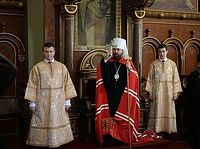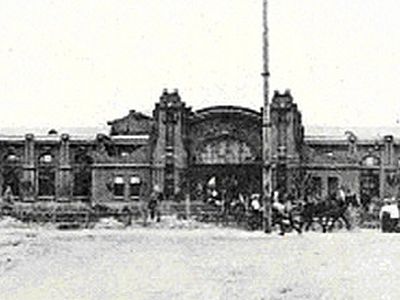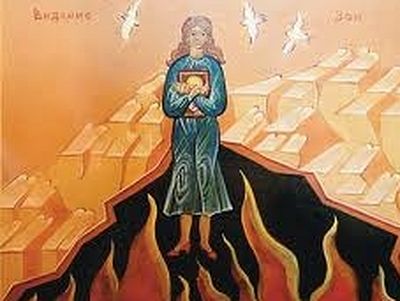“I am the good shepherd,
and know my sheep, and am known of mine”
(John 10:14).
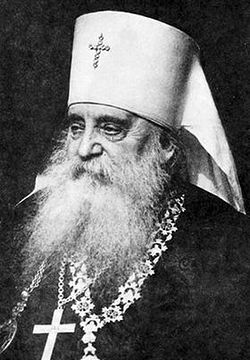 Metropolitan Anthony (Khrapovitsky)
Metropolitan Anthony (Khrapovitsky)
Without coming to know Jesus Christ and His Holy Gospel there is no eternal life, there is only eternal death, eternal doom. What are we to call a person who does not wish to read or hear the Holy Gospel? For the very word means “good news,” that is the joyous missive to every Christian, written not by man, but by the very Holy Spirit, it is a message of how the Son of God descended to earth and became as a simple, poor person, enduring the hatred and calumny of proud, ungodly men, and then received a horrifying death for our sins at the hands of people whom He Himself created out of the dust of the earth, whom He could have and can always yet “turn into the dust they were,” but instead of this righteous judgment, he calls all sinners towards repentance. And this is that good news, that holy message that we ingrates read so little, listen to with such indifference!
Tell me, Orthodox Christians: If there were ever such a man who for a grave crime were sentenced by royal decree to eternal prison, and his kind master would ask of the king that he would be forgiven, and instead this master accepted his punishment upon himself, while the criminal remained free; and that this good master sent him this good news, in a letter saying “I freed you, and took upon myself your just punishment from the king”? Tell me, brothers, what would the emancipated criminal do with this treasured letter? Would he be too lazy to read it, or hide it away in some corner? And if he did in fact decide to do this, unjustly, what would we call him? We would call him an ungrateful wicked man, unworthy of mercy, and quite the opposite: he would deserve the worst punishment.
Brothers! Every sinner is condemned by God to eternal death, but our merciful Lord Jesus Christ took upon Himself the death of all mankind and died for us on the cross, leaving to us the Holy Gospel as instruction on how to please God and thereby escape just punishment in the afterlife. The Holy Spirit inscribed all this in the Gospel, just as the master wrote in his letter, that he freed the guilty person from prison. Tell me also this: are we not all even worse ungodly people than that ungrateful criminal, if we do not wish to read the missive from God about our salvation from eternal death, to read about how our innocent Lord died for us? O, brethren! He who does not love to read the word of God, must not believe very strongly in his salvation. He apparently does not even wish to think about the fact that everything will come to an end—his work to make a living and his cares for all earthly things, that the hour will come when his soul will leave his body, for which he had labored so, even as it becomes dust, dust you sweep out of your room.
O, unfortunate man! What feeble madness blinds you! Why do you turn away from that joyous news recorded in the Gospel, that the Lord delivered us from eternal death and promised us eternal life? For only then can we have eternal life, as Christ said, when we know the one true God, Who sent Jesus Christ.
Therefore, brothers, read the Holy Gospel as often as you can and listen to it carefully in God’s temple! As you rest on your day off from work, instead of idle chatter or debates, instead of taking up quarrels or entertainments, is it not better to take this Holy Book, and if you cannot read yourself, ask someone to read for you, and listen, and call someone else to listen too, for the Lord said: “For where two or three are gathered together in my name, there am I in the midst of them” (Matthew 18:20).
 Photo: S.Vlasov / Expo.Pravoslavie.Ru
Photo: S.Vlasov / Expo.Pravoslavie.Ru
Is not conversation with the Lord Himself about His mercies not sweeter for the Christian heart than idle laughter or conflict with one’s neighbor? Is the story of the Passions which the Lord endured for us, and of His glorious Resurrection, less dear to you than some local news? Of course nothing can compare with reading the Word of God. It is like a wonderful medicine that heals all spiritual illness. For instance, if you suffer a loss and fall into sorrow and despair, the Gospel can easily console you, there you will find the words of Christ: “But lay up for yourselves treasures in heaven, where neither moth nor rust doth corrupt, and where thieves do not break through nor steal” (Matthew 6:20). Then you will see that there is no need to mourn for your loss, because it will end and decay just as your body will, but only your good deeds will not rot away, for they are all written in the book of life.
Or if you were unfairly mocked or slandered before others, and your poor soul is in sorrow and depression: open the Holy Gospel, there Jesus Christ inscribed something for you: “Blessed are ye, when men shall hate you, and when they shall separate you from their company, and shall reproach you, and cast out your name as evil, for the Son of man's sake. Rejoice ye in that day, and leap for joy: for, behold, your reward is great in heaven: for in the like manner did their fathers unto the prophets” (Luke 6:22-23).
The Lord does not command us to weep for unfair harm that befalls us, because He will reward us in heaven for everything. Or if we have wrath for our neighbor for some mischief and seek cruel revenge in your hear, quickly take up the Gospel, while the devil does not take control of your soul, and read the words of the Lord: “But I say unto you, Love your enemies, bless them that curse you, do good to them that hate you, and pray for them which despitefully use you, and persecute you; That ye may be the children of your Father which is in heaven” (Matthew 5:44-45). See how the Lord promises you that if you forgive your enemy, He will make you His child in grace! Oh, for this great mercy would we not forgive a petty insult?
And so, brethren, those spiritual labors that seem to us burdensome and difficult to bear, if we only read the Holy Gospel earnestly and with prayer, they will become light for us, and as Apostle John the Evangelist said, “For this is the love of God, that we keep his commandments: and his commandments are not grievous” (1 John 5:3); and so the Lord said in the Gospel: “Come unto me, all ye that labour and are heavy laden, and I will give you rest. Take my yoke upon you, and learn of me; for I am meek and lowly in heart: and ye shall find rest unto your souls. For my yoke is easy, and my burden is light” (Matthew 11:28-30).
If you know the commandments of Christ, then you will be the sheep of His flock, of whom He said: “I am the good shepherd, and know my sheep, and am known of mine” (John 10:14). And He is the Good Shepherd, Who will save His sheep from perilous wolves. Although the Lord even now lives with us visibly, He guides His flock through those ordained by the Holy Spirit to be our pastors and archpastors, among whom was St Nicholas, in whose church we stand today.
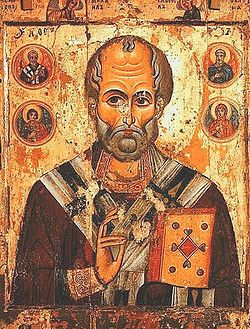
Our Russian people honors him for the fact that he had special mercy for all those in poverty, to those imprisoned, to those drowning in the sea, for the fact that he had manifested many miracles in Russia through his miracle-working icons, like in Novgorod, in St Petersburg and in other cities and monasteries of Russia; this holy man was especially merciful to the Russian people. For this reason, brethren, if you also wish to gain his mercy for yourselves, then be true Russian Orthodox Christians, fulfill the rules handed down to us from the Holy Fathers, which are all preserved solely in the One, Holy, Catholic and Apostolic Church; properly confess the Holy Faith, for that Creed which we sing during our Liturgy was composed at the Nicene Council attended by the Bishop of Christ Nicholas, who so sternly condemned the heretic Arius, who had dared to distort the Holy Faith.
And moreover, brothers, if you rely on the mercies of St Nicholas, then love with all your hearts this legacy of the saint. You know that in this holy house, under the unseen guidance of this Holy Man of God, your future spiritual pastors are being trained; here St Nicholas planted a vineyard for the people of the city of Kholm, in order to offer them the wine of Divine teaching. And so, brethren, submit to your pastors always, else you will insult their invisible teacher, St Nicholas the Miracle-worker, you will insult the Lord God Himself, Who said: “Obey them that have the rule over you, and submit yourselves” (Hebrews 13:17). Know, brethren, that St Nicholas, sending God’s mercy to all the people of Russia, is especially merciful to our region, because he provides all that is needed our spiritual pastors. Let us, brethren, pray to him that he sends down upon these students his own zeal for the faith: let us teachers and students of the seminary likewise pray.
Let all of us here today pray, the educated and uneducated, old and young, professionals and commoners, that St Nicholas the Wonderworker, Hierarch of Christ, inspire this house with his love for Christ God and the people of Kholm, that the flock led by the graduates of this school, becoming teachers and priests, would with one mouth and one heart sing the most-honorable and magnificent name of the Father and the Son and the Holy Spirit. Amen.

